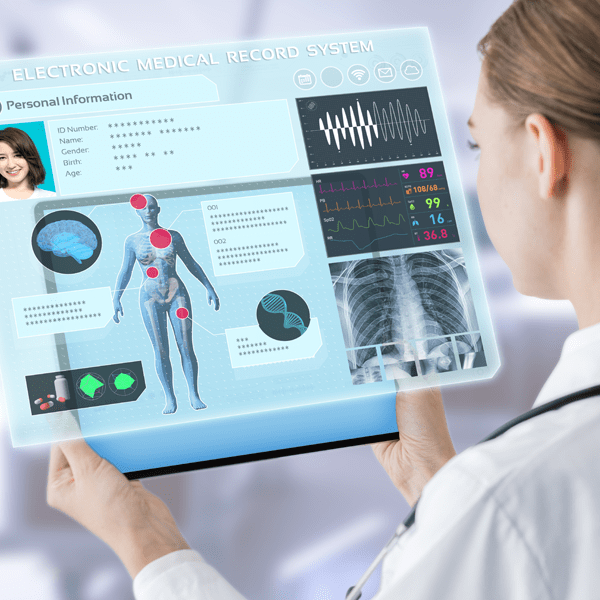How to Match Medical Device Recall Notifications to Affected Patients
Medical device recall management for time-sensitive response.
Healthcare organizations face a complex challenge when it comes to medical device recall management, particularly non-biologic implants. With thousands of non-biologic implantable devices on the market, and nearly 95% of recalls involving non-biologics, hospitals need technology that covers both tissue and implants.
Advanced UDI tissue and implant tracking software that integrates fragmented data sources into a unified system is an optimal approach to managing recalls. The FDA Recall Database, Electronic Health Records (EHR), and device manufacturers’ data must be merged to identify affected patient cases and pinpoint a recalled device inventory location in a timely response.
Managing medical device recalls is a critical process that demands swift action to ensure patient safety and compliance with regulatory standards. Under The Safe Medical Devices Act, device manufacturers are obligated to report incidents of death, serious injuries and malfunctions to the Food and Drug Administration (FDA). If the potential risk outweighs its benefits, the FDA issues a recall notice to their FDA Recall Database. FDA recall alerts are categorized according to their potential risk to patients.
Advanced UDI tissue and implant tracking software that integrates fragmented data sources into a unified system is an optimal approach to managing recalls. The FDA Recall Database, Electronic Health Records (EHR), and device manufacturers’ data must be merged to identify affected patient cases and pinpoint a recalled device inventory location in a timely response.
Managing medical device recalls is a critical process that demands swift action to ensure patient safety and compliance with regulatory standards. Under The Safe Medical Devices Act, device manufacturers are obligated to report incidents of death, serious injuries and malfunctions to the Food and Drug Administration (FDA). If the potential risk outweighs its benefits, the FDA issues a recall notice to their FDA Recall Database. FDA recall alerts are categorized according to their potential risk to patients.


Medical device recall management for time-sensitive response.
Healthcare organizations face a complex challenge when it comes to medical device recall management, particularly non-biologic implants. With thousands of non-biologic implantable devices on the market, and nearly 95% of recalls involving non-biologics, hospitals need technology that covers both tissue and implants.
Advanced UDI tissue and implant tracking software that integrates fragmented data sources into a unified system is an optimal approach to managing recalls. The FDA Recall Database, Electronic Health Records (EHR), and device manufacturers’ data must be merged to identify affected patient cases and pinpoint a recalled device inventory location in a timely response.
Managing medical device recalls is a critical process that demands swift action to ensure patient safety and compliance with regulatory standards. Under The Safe Medical Devices Act, device manufacturers are obligated to report incidents of death, serious injuries and malfunctions to the Food and Drug Administration (FDA). If the potential risk outweighs its benefits, the FDA issues a recall notice to their FDA Recall Database. FDA recall alerts are categorized according to their potential risk to patients.
Advanced UDI tissue and implant tracking software that integrates fragmented data sources into a unified system is an optimal approach to managing recalls. The FDA Recall Database, Electronic Health Records (EHR), and device manufacturers’ data must be merged to identify affected patient cases and pinpoint a recalled device inventory location in a timely response.
Managing medical device recalls is a critical process that demands swift action to ensure patient safety and compliance with regulatory standards. Under The Safe Medical Devices Act, device manufacturers are obligated to report incidents of death, serious injuries and malfunctions to the Food and Drug Administration (FDA). If the potential risk outweighs its benefits, the FDA issues a recall notice to their FDA Recall Database. FDA recall alerts are categorized according to their potential risk to patients.
Benefit from data-integrated access:
Recall identification at your fingertips.

Data-integrated approach for medical device recall identification.
Identifying affected patient cases promptly is crucial, but hospitals often rely on third-party notification services that do not contain this information. Staff must sort through siloed data from multiple sources to match a medical device recall with affected patients, which requires extensive manual effort.
The UDI Initiative standardized barcodes requires a Unique Device Identifier (UDI) for all tissue and non-biologic implant devices. This helps identify individual pieces and improves data for easier recall identification. The key is having a software solution that combines this data with inventory and patient information to identify affected items and patients.
The UDI Initiative standardized barcodes requires a Unique Device Identifier (UDI) for all tissue and non-biologic implant devices. This helps identify individual pieces and improves data for easier recall identification. The key is having a software solution that combines this data with inventory and patient information to identify affected items and patients.
Match medical device recalls to affected patient cases.
InVita’s UDITracker RecallConnect feature goes beyond connecting recalls to patients and inventory. With advanced data-integrated technology, tissue and implant medical device tracking software is used as a solution for simplifying recall management. This process is exemplified by the seamless data integration within the software that makes it easier for all involved stakeholders.
When a recall occurs, UDITracker pulls data from the FDA Recall Database, which is integrated with patient data from EHRs and device manufacturers’ databases. Recalls may be listed according to product codes, lot numbers, or affected serial numbers. As part of UDITracker’s case entry interface, those codes, lots, or affected serial numbers are automatically matched against implanted patient cases.
When a match occurs, an alert appears on the main dashboard. Alerts are also emailed in the event of an urgent medical device recall to expedite necessary actions, ensuring patient safety. Each case has a link that provides all the required information regarding the affected case. An integrated system automates cross-referencing and ensures patient safety and operational efficiency.
When a recall occurs, UDITracker pulls data from the FDA Recall Database, which is integrated with patient data from EHRs and device manufacturers’ databases. Recalls may be listed according to product codes, lot numbers, or affected serial numbers. As part of UDITracker’s case entry interface, those codes, lots, or affected serial numbers are automatically matched against implanted patient cases.
When a match occurs, an alert appears on the main dashboard. Alerts are also emailed in the event of an urgent medical device recall to expedite necessary actions, ensuring patient safety. Each case has a link that provides all the required information regarding the affected case. An integrated system automates cross-referencing and ensures patient safety and operational efficiency.


Match medical device recalls to non-biologic implant inventory.
The complexity of matching recall notifications to implant inventory and pinpointing an items storage location requires an effective tracking solution for tissues and implants. UDITracker’s QuickReceipt functionality facilitates the data integration with manufacturers to ensure quick and accurate entry of product information into the system. This enables inventory item identification against affected product codes, lots, or serial numbers.
Apart from saving nurses time and effort, the software pinpoints the exact location of all inventory items, whether they are in a bone freezer, an operating room, or a downtown medical center. Healthcare organizations who wish to reduce spend, increase revenue, avoid compliance risk, and make informed decisions to improve their bottom line require this level of real-time visibility.
Apart from saving nurses time and effort, the software pinpoints the exact location of all inventory items, whether they are in a bone freezer, an operating room, or a downtown medical center. Healthcare organizations who wish to reduce spend, increase revenue, avoid compliance risk, and make informed decisions to improve their bottom line require this level of real-time visibility.
Managing medical device recalls for operational efficiency.
Multi-departmental involvement adds to the complexity of managing recalls. Connecting the dots and responding quickly to recalls is challenging when clinical staff, materials management, and supply chain teams work with fragmented data sources.
Manually cross-referencing medical device recall notifications to patient health records, inventory, and manufacturer information takes time and results in delays in recall identification and response. When recall information isn’t disseminated and acted upon promptly, patient safety and compliance risks arise.
Manually cross-referencing medical device recall notifications to patient health records, inventory, and manufacturer information takes time and results in delays in recall identification and response. When recall information isn’t disseminated and acted upon promptly, patient safety and compliance risks arise.


Medical device recall identification accelerated with automated solution.
Hospitals need technology that integrates multiple data sources into one centralized system.
Software that manages both tissue and implant devices and integrates data from all key players solves this issue. Taking a holistic approach to medical device recalls for interdepartmental use is critical for patient safety, compliance, and operational efficiency.
By leveraging data-integrated software, recall matching can be automated. By identifying affected patients and device storage locations in a fraction of the time, hospital staff can manage medical device recalls efficiently.
Software that manages both tissue and implant devices and integrates data from all key players solves this issue. Taking a holistic approach to medical device recalls for interdepartmental use is critical for patient safety, compliance, and operational efficiency.
By leveraging data-integrated software, recall matching can be automated. By identifying affected patients and device storage locations in a fraction of the time, hospital staff can manage medical device recalls efficiently.